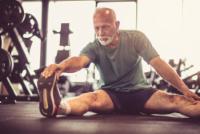Ask Mr. Pedometer and Friends…
June 15, 2019
Q: Mr. Pedometer, I read that “Every 11 seconds in the U.S., an older adult ends up in the emergency room due to a fall. ‘It’s the leading cause of accidental death in the elderly,’ says Catherine Colon-Emeric, M.D., chief of geriatrics at the Duke University School of Medicine. Do you have any advice that could help us avoid falling?
A: You certainly are not alone in having concerns about falling – and with good reason. The June issue of Consumer Reports on Health has some tips to help prevent falls. Below are the 8 tips that can help all age groups but especially the elderly to avoid the risk of a broken hip or a concussion:
-
WATCH FOR MED SIDE EFFECTS
– “Some prescription and over-the-counter meds can affect balance. For instance, diuretics may lower blood pressure too much and lead to dizziness on standing. Some allergy drugs, such as diphenhydramine (Benadryl and generic) may cause dizziness and sleepiness….Some meds can cause dehydration, which can also increase the risk of falling when you stand up…. At least once a year, review your meds – Over-the-counter, alternative products, and supplements – with your doctor.”
-
KEEP YOUR SENSES SHARP
– “Eyesight naturally changes with age… [which] can make it more difficult to see shifts in terrain and other stumbling blocks. Hearing loss, too, has been linked to an increased risk of falling. A 2012 study from the Johns Hopkins University School of Medicine, for example, found that middle-aged people with mild hearing loss were three times as likely to fall. See your eye doctor every year or two…. Have your ears checked at least every three years starting at age 50, or earlier if you are having trouble hearing.”
-
DECLUTTER AND REPAIR AT HOME
– “Rugs, clutter, steps, cracked driveways and sidewalks, poor lighting, slick surfaces – all can contribute to tumbles. If you’re concerned about falling in the house and unsure about how to proceed, the Institute on Aging (blog.ioaging.org) has a home safety checklist.”
-
STRENGTHEN KEY MUSCLES
– “Exercises that enhance gluteal, leg, and core strength
 help with balance, says Colon-Emeric. ‘These muscles make it easier to catch yourself before you fall and make it easier to get out of bed, lift yourself off the toilet, or get out of the car.’ Moves like knee bends (stand tall and bend your knees as if you were going to sit in a chair behind you) and sideways walking (keeping feet parallel, step out to the side with one leg, bring the other foot to meet it, then step out again) are part of a balance program called Otago that’s recommended by the Centers for Disease Control and Prevention.”
help with balance, says Colon-Emeric. ‘These muscles make it easier to catch yourself before you fall and make it easier to get out of bed, lift yourself off the toilet, or get out of the car.’ Moves like knee bends (stand tall and bend your knees as if you were going to sit in a chair behind you) and sideways walking (keeping feet parallel, step out to the side with one leg, bring the other foot to meet it, then step out again) are part of a balance program called Otago that’s recommended by the Centers for Disease Control and Prevention.” -
PRACTICE FOR FALLS
– “’Exercise is important, but simply practicing getting off the floor can make you stronger and less likely to fall,’ says Kathleen Bell, M.D., a psychiatrist and chairwoman of the department of physical medicine and rehabilitation at the University of Texas Southwestern Medical Center. She suggests getting up and down 10 times three to four times a week. (When starting out, do this next to a bed or another stable object you can hold onto.)”
-
SKIP THE FANCY FOOTWEAR —
“If you struggle with balance, choose shoes with sturdy, nonskid soles that fit snugly enough so they’re not sliding around underneath you. ‘You don’t have to opt for ugly shoes, but you don’t want to be walking around in bedroom slippers either,’ Bell says. If you’re unsteady, heels aren’t a good idea, nor are those hot-weather favorites, flip-flops. They offer zero support, catch on rugs, often have little grip on slick surfaces, and slip off easily.”
-
TRAIN FIDO RIGHT –
“Having a pet can be good for your health, but your beloved pooch may also trigger falls by tripping you or pulling you down…. ‘Besides making sure you’re matched with a dog that suits your lifestyle, working with a trainer to learn how to control your dog and using a good leash and collar can help minimize falls,’ says Grace Anne Mengel, V.M.D., an assistant professor of clinical primary care at the University of Pennsylvania School of Veterinary Medicine.”
-
FACE YOUR FEARS –
“Research suggests that simply being afraid of falling increases your likelihood of taking a tumble. In part, anxiety about falling can make it harder to focus on your surroundings. This fear can also cause you to limit physical activity, which in turn can lead to muscle weakness. If you find yourself frequently worried about falls, speak to your doctor.”
I hope these suggestions can help you avoid falling and allow you to continue to enjoy taking walks.